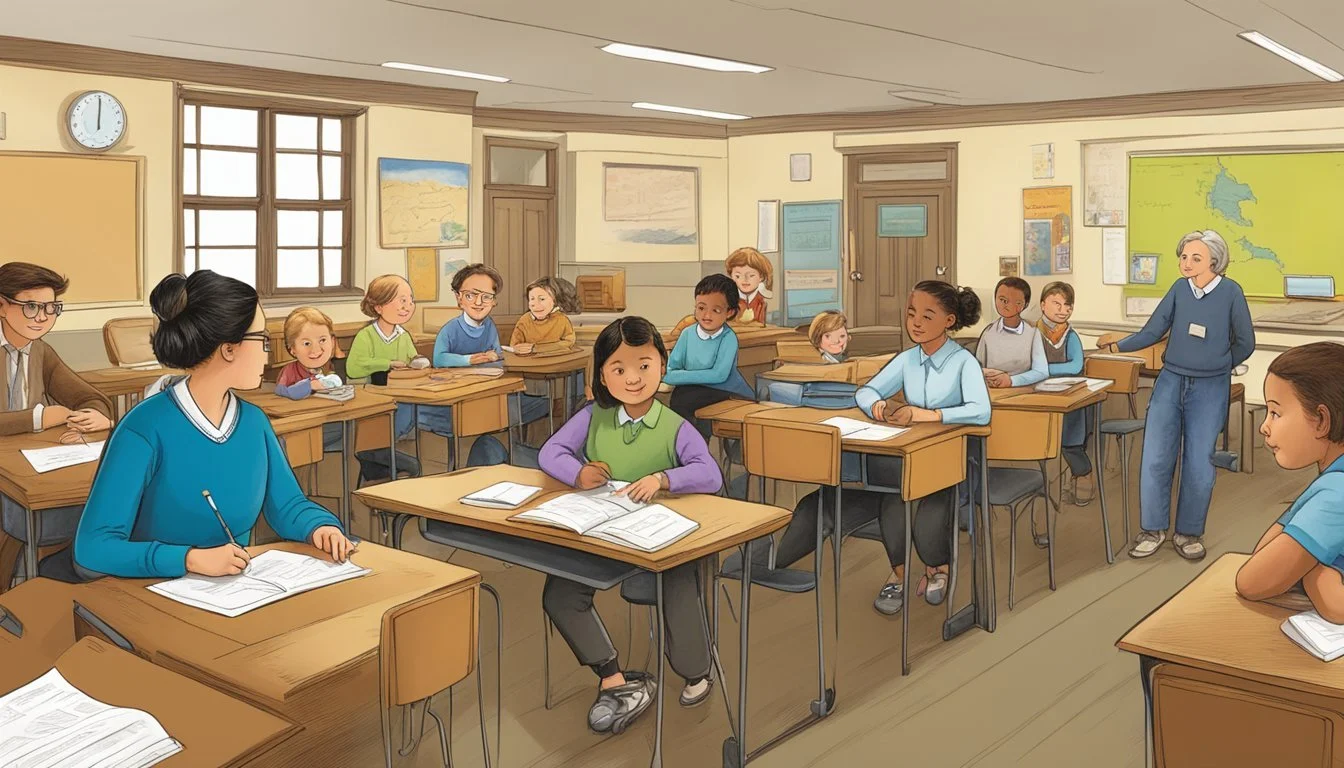The Legacy of German Texan Teachers
Shaping Education in the Lone Star State
German Texans have contributed significantly to the educational landscape of Texas, with legacies that persist in the state's cultural and academic institutions. Dating back to the mid-19th century, German immigrants brought with them a dedication to education that would deeply influence their new communities. The German Free School Association of Austin, chartered in 1858, illustrates the early commitment to education by these settlers. It became the first chartered school in Austin, setting a precedent for accessible education that was agnostic to religious belief, thereby laying the foundations for inclusive educational practices.
These Texan educators of German descent were instrumental in promoting a curriculum that combined both German and Texan influences, creating a unique educational experience for students. Their approach was not only seen in language and cultural studies but also in the introduction of comprehensive public education systems. In towns like Fredericksburg and New Braunfels, the integration of German educational principles can also be seen in the preservation of the German language through educational programs, reflecting a broader desire to maintain and cherish German cultural identity alongside Texan values.
Moreover, the early German Texan teachers were pivotal in advocating for the importance of public education, science, and the arts. Their influence was palpable across Texas, evident in the architecture of schools, the festivals celebrating German heritage, and the continued teaching of German language and culture. Through their dedication, they instilled a respect for education that echoed their own cultural values of community, freedom, and equality — values that continue to be a part of Texan identity today.
Historical Context of German-Texan Teachers
German-Texan educators have a distinguished history originating from the strong educational traditions that German immigrants brought to Texas. These educators played a pivotal role in the formation of a unique cultural and educational landscape in Central Texas.
Initial Wave of German Immigration to Texas
German immigration to Texas began earnestly in the 1830s when the Adelsverein, also known as the Verein zum Schutze deutscher Einwanderer in Texas (Society for the Protection of German Immigrants in Texas), facilitated the movement of thousands of German immigrants to the region. Intent on creating new opportunities, many of these immigrants settled in Central Texas, founding towns such as New Braunfels and Fredericksburg. These settlers brought with them a deep respect for learning and a robust tradition of education that would heavily influence the development of local communities.
Formation of German Communities in Central Texas
Central Texas quickly became a hub of German-Texan culture, with towns like Boerne, Luckenbach, and others in the Hill Country developing their own identities. Education was central to these communities, and German-Texan teachers were instrumental in establishing the first schools. Though the Texas Legislature, in the aftermath of World War I, passed legislation like House Bill 304 that prohibited the teaching of German in public schools, the impact of German-Texan educators continued to be felt. Many of the first educational institutions in Central Texas were the result of effort by German immigrants and educators, and a significant number of them were keen on ensuring their children were literate both in English and German.
The German-Texan Heritage Society and other cultural institutions continue to appreciate and maintain this heritage. Today, the contributions of German-Texan educators are acknowledged as having shaped one of the most prominent ethnic groups in Texas, reflecting on a legacy that remains evident in Central Texas's educational and cultural landscape.
German Educators in the 19th Century
In the 19th century, German educators played a crucial role in shaping the educational landscape of Texas, having established schools that preserved their language and culture, and navigating the tumultuous period of the Civil War.
Establishment of German Schools
German immigrants in Texas founded numerous schools in the 19th century, ensuring their language and cultural heritage were passed to successive generations. These schools were often the centerpieces of German-Texan enclaves, acting as communal points for education and the propagation of traditional German values. The curricula typically included subjects taught in Germany, contributing to the maintenance of German language proficiency among pupils.
Role of German-Texan Teachers During the Civil War
During the Civil War, German-Texan teachers found themselves in a complex situation due to the pro-Union sentiment prevalent among the German communities in Texas—a state that was part of the Confederacy. They often served not just as educators but also as community leaders, providing guidance in a time of national crisis. Despite the external pressures, German-Texan teachers continued their educational work, sometimes facing suspicion and hostility because of their Unionist leanings and efforts to maintain German culture through education.
Integration and Challenges in the 20th Century
In the 20th century, German-Texan educators faced significant adversities stemming from the world wars, which profoundly affected their ability to teach and preserve German culture. Despite these challenges, they endeavored to maintain their heritage through education in various communities, including San Antonio and Houston.
Impact of World Wars on German-Texan Educators
During World War I, anti-German sentiment swept Texas, leading to the suppression of the German language and culture. Educators of German descent faced violent reprisals for any perceived lack of patriotism. The Texas Legislature in 1919 exacerbated the crisis by prohibiting the teaching of German in any public academic setting through House Bill 304.
Moving into the period between the World Wars and beyond, German-Texan teachers in places like Bryan continued to navigate the balance between integrating into the wider Texan culture and sustaining their unique identity. Industry growth, especially during World War II, further escalated the demand for assimilation and the de-emphasis of German heritage.
Preservation of German Culture Through Education
Despite these pressures, German-Texans strived to keep their culture alive, with education serving as a potent vehicle for cultural preservation. In San Antonio, the existence of a vibrant German community facilitated the endurance of German heritage through various forms, including educational societies and community centers.
For instance, San Antonio's 151-year-old Beethoven Hall stands as a testament to the enduring legacy of German-Texan educators who created spaces for the community to come together and celebrate their heritage. Similarly, in educational settings, clandestine efforts to pass on the German language and traditions were made to ensure the younger generations retained a connection to their roots.
Modern Contributions and Legacy
The impact of German Texan educators extends into the present day, where their contributions continue to shape language education and academic research within Texas.
Contemporary German Language Teaching in Texas
In numerous public and private schools across Texas, German language teaching endures as a testament to the state's cultural heritage. The American Association of Teachers of German - North Texas Chapter actively supports educators by sharing resources and pedagogical strategies to enhance the teaching of the German language.
German Texan Teachers in Higher Education
Professors and scholars at institutions such as the University of Texas at Austin have developed considerable German Studies programs. These educators not only teach the German language but also impart a comprehensive understanding of German-Texan culture. Additionally, colleges in cities like San Marcos offer courses that delve into various aspects of German influence in the region.
Legacy of German Texan Educators
The lasting contributions of German Texan educators are documented and available for research through platforms such as The Portal to Texas History and publications by the University of Texas Press. These resources preserve the historical narrative and ensure the legacy of German Texan teachers remains accessible to future generations.
Cultural Heritage and Societal Impact
The legacy left by German-Texan teachers goes beyond the classroom with a profound effect on both Texas' educational system and community life.
German-Texan Influence on Texas’ Educational System
German immigrants who settled in Texas brought with them a rich educational tradition that was soon integrated into the local school systems. In the 19th century, German-Texans established some of the first schools in Texas. They emphasized a well-rounded curriculum, which often included music, physical education, and the German language, a blend that was distinct from other educational models present in the region. The introduction of bilingual education, with German and English, by these educators had a lasting impact on the educational policies within the Texas Legislature, evidencing the significance of the German language and culture in Texas, sometimes referred to as “Texas German.”
Notable contributions to Texas' education by German-Texans include:
Bilingual instruction in public schools
Establishment of cultural institutions and libraries
Advancements in teacher training and pedagogical methods
Role of German-Texan Teachers in Community Life
German-Texan teachers often held a central role in shaping community life beyond their educational duties. They served as cultural ambassadors, bridging German and Texan traditions. Through various cultural functions and organizations, such as festivals, choirs, and social clubs, these educators fostered a sense of community pride and cohesion. They were instrumental in the construction of community halls, churches, and the founding of Vereins (associations), which solidified their role not only as educators but also as key community figures.
Community impacts driven by German-Texan educators:
Festivals that celebrated German heritage
Introduction of musical ensembles and choirs
Creation of social institutions like shooting clubs and dance halls
Prominent Figures and Institutions
The historical landscape of education in Texas has been notably enriched by German-Texan educators and scholars, alongside institutions that trace their origins to German roots, reflecting a profound legacy of cultural transmission and academic excellence.
Notable German-Texan Educators and Scholars
John O. Meusebach, the founder of Fredericksburg, was also a visionary education advocate who left a lasting mark on Texas pedagogy. In New Braunfels and Fredericksburg, German-Texan educators generated a foundation of knowledge that bolstered both local and statewide academic standards.
German influence extends to educators like Otto Koehler, who, although primarily known as a brewing magnate, played a significant role in promoting educational causes and economic development which indirectly supported educational infrastructures.
Key Educational Institutions with German Roots
Fredericksburg and New Braunfels: These towns were pivotal in fostering German-Texan education through the establishment of early schools that not only served the German-Texan community but also offered quality education more broadly in Texas.
The German Free School Association of Austin: Founded on January 19, 1858, this institution represents the early commitment of German-Texans to accessible education, marking it as the first chartered school in Austin, with a mission to educate children independent of religious beliefs.
The Texas German Heritage Society: An organization dedicated to preserving and promoting German heritage and influence, including the significant contributions German-Texans made to education and scholarship in Texas.
By embracing the Texas German dialect and heritage within these educational contexts, these institutions have enriched the cultural tapestry of the state and continue to underscore the importance of diverse cultural contributions to the educational landscape.
Resources and Further Reading
Books and Publications
"Journey to Texas, 1833" by D. T. F. (Detlef Thomas Friedrich) Jordt
An early observer's account of German immigration to Texas.
Preserving German Texan Identity by Walter L. Buenger and Walter D. Kamphoefner
Examination of German Texan lives in the late 19th and early 20th centuries.
The Texas German Dialect Project (TGDP) Newsletter
Insights into the linguistic history of German Texans.
Digital Collections
The Portal to Texas History
Digitized materials related to German Texan heritage.
Educational Resources
University of Texas Press
Scholarly works detailing the narratives of German immigrants in Texas.
Supportive Organizations
AATG North Texas Chapter
Resources for educators and individuals interested in German language and culture.
Maps and Graphics
Texas German Immigration Map by Justin Cozart
Chronological map displaying key events in the history of Texas Germans.
Academic Inquiries
Department of History, Texas State University
Lectures and research on German Texan history, including the impact of the "German 48ers."
Each resource provides valuable insights into the contribution of German educators to Texas's cultural and academic landscape. For a comprehensive understanding of the German Texan legacy, educators, students, and researchers are encouraged to evaluate these sources critically.









